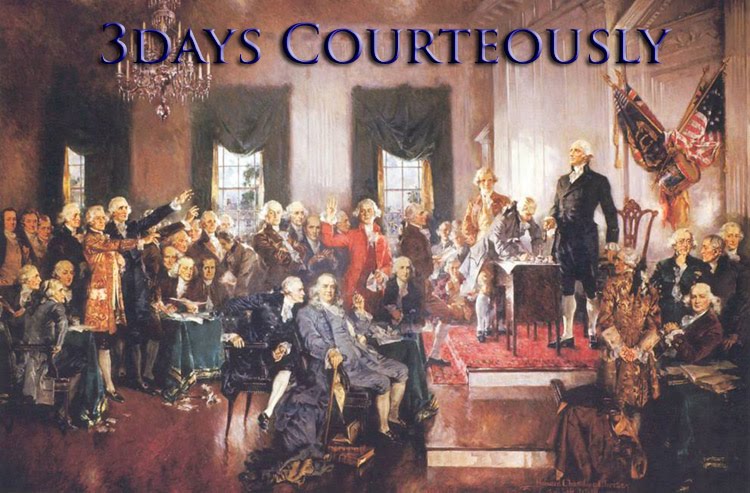 There is perhaps no more controversial political topic than the role (if any at all) morality should play in politics. It's particularly difficult for people to understand how government can even claim the right to set any sort incentive, standard or outright prohibition regarding behaviors in a free society. Many cannot see how morality issues have any bearing on how people want the government run. Many cannot even see how morality issues have any relation to other governing factors. After all, what does same-sex marriage have to do with the tax rate?
There is perhaps no more controversial political topic than the role (if any at all) morality should play in politics. It's particularly difficult for people to understand how government can even claim the right to set any sort incentive, standard or outright prohibition regarding behaviors in a free society. Many cannot see how morality issues have any bearing on how people want the government run. Many cannot even see how morality issues have any relation to other governing factors. After all, what does same-sex marriage have to do with the tax rate?
LDS leader and member of the Quorum of the Twelve Elder D. Todd Christopherson gave an excellent talk on moral discipline last week during general conference. The talk was rich on many levels, but I want to look at it for what it says on morality as a political principle. Before going further, let me state the obvious in that he did not take his points to the extents I will. I speak for myself alone.
Elder Christopherson decried that much of society has fostered a culture of moral relativism that makes it increasingly difficult to condemn any sort of value judgement.
"As a consequence, self discipline has eroded and societies are left to try to maintain order and civility by compulsion. The lack of internal control by individuals breeds external control by governments."
This point could not be simpler, but likewise cannot be over-emphasized. People need government b/c they cannot govern themselves. As Thomas Paine said, "Society is produced by our wants and government by our wickedness."
Think of it in terms of speed limits. In a perfect world, we'd be able to drive safely without causing any harm to others. Some people would naturally drive fast and some slowly. We'd all drive according to our ability. Sad experience teaches us, however, that this is not the case. We want to go too fast, beat trains, graze pedestrians and soon the government must step in. The same principle holds true with most laws.
Elder Christopherson goes on to quote the famous columnist Walter Williams in saying,
"Gentlemanly behavior used [for example, once] protected women from coarse behavior. Today, we expect sexual harassment laws to restrain coarse behavior.... Policemen and laws can never replace customs, traditions and moral values as a means for regulating human behavior. At best, the police and criminal justice system are the last desperate line of defense for a civilized society. Our increased reliance on laws to regulate behavior is a measure of how uncivilized we've become."
In another powerful phrase, he quotes Bishop Fulton J. Sheen, who said "We would not accept the yoke of Christ; so now we must tremble at the yoke of Caesar."

Whenever people fail to govern themselves, it hurts society and inevitably leads to calls for "someone" to fix it. This someone is usually the government. When fathers leave children, this not only comes at a tremendous cost to their family, but to society at large. With some things, society is willing to absorb the costs (such as most free speech). In others, such as the disintegration of the family, the costs are simply too widespread and too deep to sit back and not step in. It affects crime, education, economic productivity, not to mention the damning toll it takes on the human soul. In these cases, government could never hope to do of necessity that which the family could not do for love. The most it can hope for is to minimize the damage to these people and to society. Likewise, what lady would suggest that the vague protection of sexual harassment laws is superior to a man who knows his boundaries and lives with honor?
The reason morality issues cannot be altogether ignored is because the private and the public run together. This is a complicated topic and the fact that government cannot ignore morality issues is temptation to the statist who would want to seize more control. This is why conservatives try to inculcate morality, most of the time not through government at all. When it does take a political form, it is usually through subsidiary roles such as tax exemption for churches, non-profits, charities, incentives to marry (tax cuts) etc. It is done by getting out of people's way, not the reverse.
Society is willing to bear the costs of most moral depravity simply b/c of the high value we place on liberty. However, while many may wish that government never interfered with morality issues, let me suggest that it is naive to think that the things most important (ie family) in "the laws of nature and nature's God" would not have any bearing in the here and now. It is nothing less than the tyranny of a strangling ideology to say "Who are we to tell others how to live?" and then, by necessity, ask society to forget yet remedy the consequences of this moral relativism. It is a tenuous order of liberty to say the least.
Photo Credits: Sodahead.com, lds.org and ceu.edu


